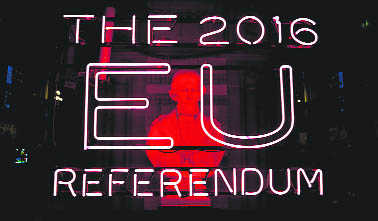
BRITAIN is expected to submit an application to leave the European Union following Thursday’s referendum, after which it would have two years to negotiate an exit. Below are possible consequences for Britain and the EU of a Brexit.
Freedom from budget rules
Britain would no longer be subject to EU budget rules, which limit a government’s budget deficit to 3% of gross domestic product and public debt to 60% of GDP. It could, therefore, run whatever budget shortfall it wants without admonishment from the European Commission and other EU ministers. It would also be free from the Commission’s monitoring and advice on future actions.
(Follow The Tribune on Facebook and Twitter @thetribunechd)
Finance firms will be hit
Financial services firms based in Britain, from banks to clearing houses and funds, could lose their money-spinning EU “passports”, which allows them to sell services across the 28-nation bloc with low costs and a single set of rules. The passporting system has contributed to making London one of the world’s most important financial centres.
Some American, Japanese and other non-European banks that have European headquarters in London have said they would consider moving parts of their business inside the European Union, in the event of a Brexit.
Focus on goods than services
The rest of the EU has a trade surplus in goods of about 100 billion euros ($110 billion) with Britain, while Britain exports some 20 billion euros in services than it imports, principally due to financial services. Brexit campaigners say if would be in the EU’s interest to agree a free trade deal with Britain even if it leaves the bloc. However, there tends to be more of a focus on goods than services in free trade deals.
More legal cost for firms
British companies acquiring EU peers would still need approval from the UK competition watchdog and the European Commission, resulting in more legal costs and the risk that each delivers a different ruling.
Britain will have a free hand to aid ailing companies or industries without fear of EU action but it will also not be able to oppose subsidies granted by EU governments to their own national champions.
Energy infra costlier
Leaving the EU could make UK energy infrastructure investment costlier and delay new projects at a time when the country needs to plug a looming electricity supply gap.
The uncertainty after Brexit could make energy investors demand higher returns for the risk of less favourable conditions. Oil and gas majors BP and Shell are among energy companies who warned about the potential downside.
Tough on climate
Britain is the second-largest emitter of greenhouse gases in Europe and its utilities are among the largest buyers of carbon permits in the EU Emission Trading System (ETS).
Although most analysts believe Britain will remain in the cap-and-trade scheme, the vote is viewed as bearish for the market as Britain would no longer be able to drive tough reforms to drive up the price.
Aviation will feel the heat
A Brexit could call into question EU agreements on open airspace that have granted the region’s airlines unlimited access to the skies of fellow member states, benefiting both UK and EU airlines.
It would also affect transatlantic routes because of the EU-US Open Skies agreement, which gives British airlines unlimited flying rights to the United States.
Foreign policy will get push
Along with France, Britain is the leading foreign policy power in the European Union, boasting a large military and close ties with the US. After a Brexit, Washington has made clear it will be less interested in London as an ally because of a perceived loss of influence.
Britain would no longer be bound by joint EU positions, for instance on economic sanctions against Russia. Britain would remain a member of NATO.
Less cooperation on policing
Britain currently recognises other EU members’ arrest warrants, exchanges police information, including personal data, and is a member of the bloc’s police agency Europol.
Its future involvement, including access to EU databases, could diminish, meaning less cooperation on policing and fighting crime. — Reuters



























